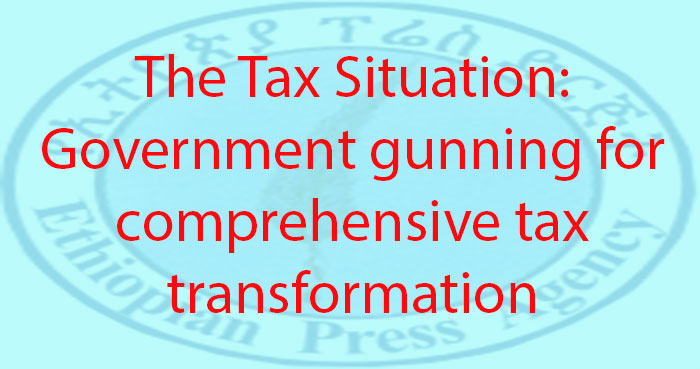
Improving tax revenue collection is an important priority for a developing country like Ethiopia, not least because it has one of the lowest Tax-to-GDP ratios, even by SubSaharan Africa standard. But also for the role it plays in reducing the country’s ballooning national debt, and financing its public expenditure.
Finding mechanisms to improve the country’s tax revenue involves for the government to improve tax compliance, and increase domestic resource mobilization. While the government has recently implemented tax movement to boost revenue collection to a successful outcome, the country still has a low tax compliance that should be improved promptly.
Ethiopia has disconcertingly low tax compliance as a nation, says Kebede Lidetu, Director of Risk and Compliance at Ministry of Revenue, and it should be improved given that tax compliance is a fundamental ingredient to a successful tax revenue collection. To this end, various strategies that range from education to giving recognition and penalizing tax evaders are being implemented, he notes.
On top of tax enforcement mechanisms like auditing and financial intelligence, other strategies that would anchor and strengthen other tax compliance works are being undertaken, including approving a national strategy that would manage tax compliance. According to him, education remains a pivotal and necessary tax compliance strategy that would bring people to comply voluntarily.
There have been works to make sure that there is a better understanding on tax within the society through education. These efforts include encompassing tax into the new education roadmap, and setting up an independent directorate that would solely oversee taxpayers’ education. While the aim is to equip the general public with better grasp on tax, there is also a plan to give recognition for those who comply with their taxes, as it has a positive effect on voluntary tax compliance.
“In the coming months, awards and recognition will be given out to compliant traders and companies.” He believes that compliance strategies such as education and recognition should go hand in hand with tax enforcement mechanisms like auditing for maximum success.
The Tax man’s Dilemma: Coercion or Persuasion for Ethiopia?
Citing a recent study spearheaded by African Development Bank, Kebede states that both stick and carrot approach have positive impact on improving tax compliance, and the Ministry should move ahead accordingly. As to Abebe Shimeles, Director of Research at African Development Bank, it is possible for the people to voluntarily comply to paying their taxes.
As member of the team that conducted the study, he says that the communities will pay their taxes if the accurate information is made available to them. They would want to know why they are paying their taxes and where it is going. “We suggested to the Ministry to enter into a social contract with the public (and I think they are doing it).”
They should make it available how the money from the taxpayers has been used. In addition to this, he continues, every taxpayer has to be seen in the same eyes when it comes to taxing them. “If they believe there is no equity between them, they might avoid taxes; so, the Authority should address this.” Other than this, tax enforcing mechanism like auditing also brings good result when it comes to improving tax compliance [and tax collection].
As per the recommendation of the study, Abebe says that there need to be a consensus made between the government and the taxpayers through the application of information technology. According to Dr. Wondaferahu Mulugeta, Economics Associate Professor at Federal Meles Zenawi Leadership Academy, perception on equity and fairness of the tax system, and their confidence on it, are major factors affecting tax compliance behavior in Ethiopia. “Notwithstanding the taxpayers moral hazard problem, if they think the tax system is not fair or equitable, they tend to avoid paying taxes.”
The tax evaders cite that the tax system do not look equally at public and private institution and businesses. They mention some public institutions not being taxed as a reason for avoiding tax. If there are government institutions that are not taxed, there should be a compelling reason as why that is. The government should make the public aware why they are not taxed and create an understanding with them, he argues.
They also cite some businesses that are not even in the tax packet or avoid taxation by under-reporting income, while they are made to pay taxes. And such low confidence on public policy has reduced voluntary complaints.
As to Kebede, in a tax compliance context, exercising this responsibility requires having a systematic approach for managing tax compliance risks and various determinants for tax avoidance in a bid to ensure that such risks are properly identified, assessed, prioritized and treated. This means that addressing tax evaders through their own prism of non-compliance, as some evade for simple lack of information, and some could easily be coerced to paying their taxes.
The Reform/Transformation
Speaking to experts of the tax industry last week, Finance State Minister Dr. Eyob Tekalegn said that the government is embarking on a comprehensive tax transformation, working to significantly improve the tax to GDP ratio.
“We are overhauling the entire tax regime, to improve tax collectors capacity, and have a first class tax policy that can give us a good room to expand the tax base. So, you will see a lot of changes in the coming months.” With regards to this, Kebede laments on the need of improving the tax to GDP ratio especially given that it is getting even lower.
The reform is targeting to improve the ratio, and bring a change in tax compliance so as to improve the revenue collection of the country. In order to achieve this, various transformation initiatives that are part of the tax reform are being implemented, and they are expected to transform and reform the tax and custom sector.
The Ethiopian Herald, May 8/2019
BY ROBEL YOHANNES





